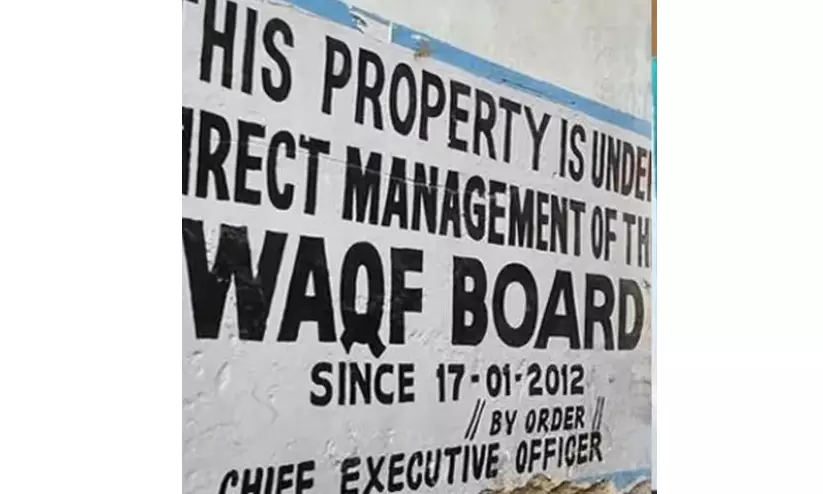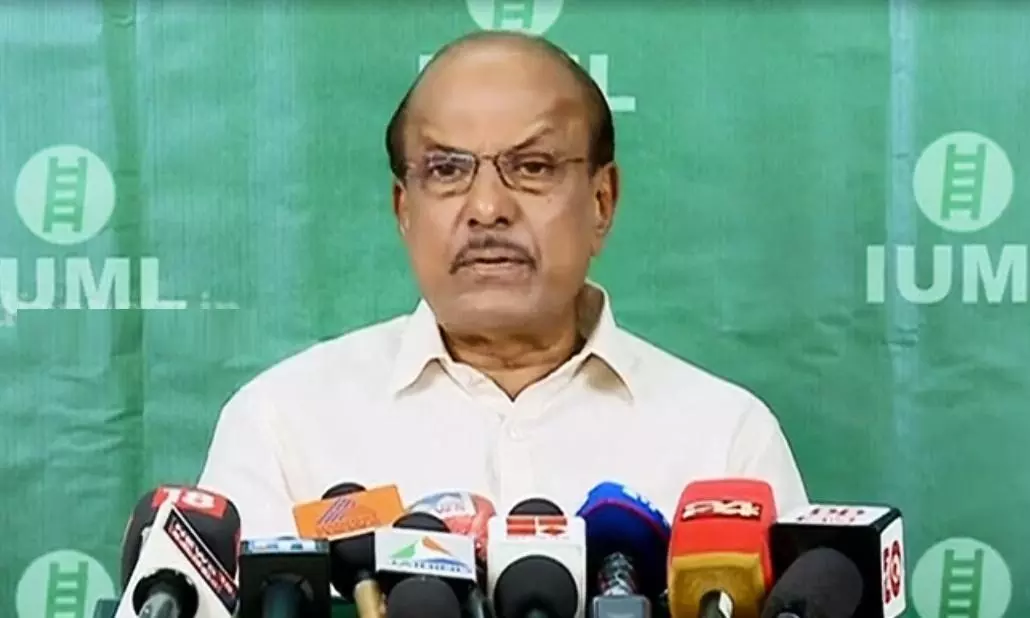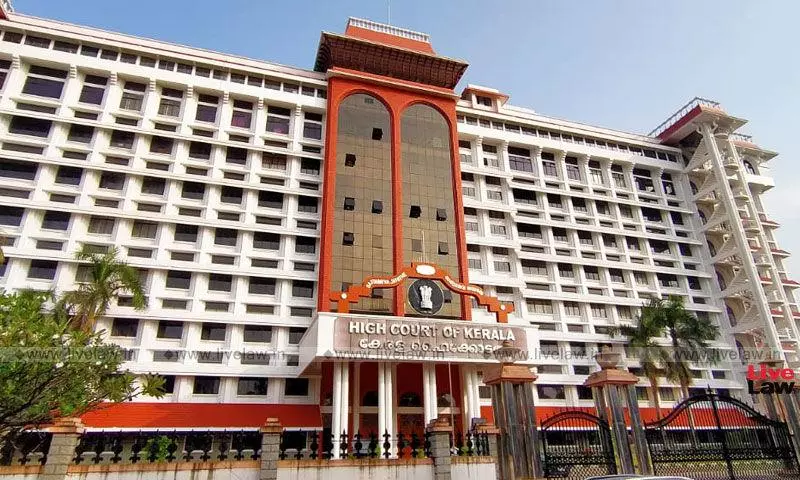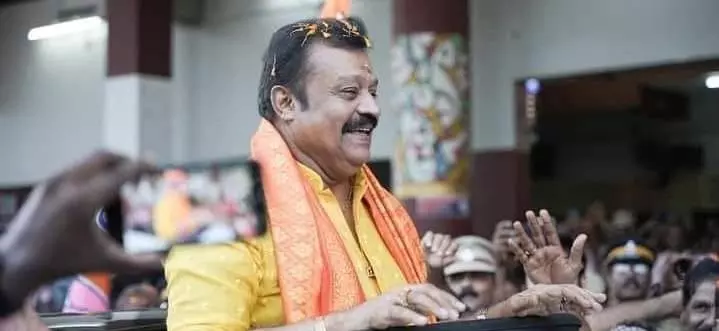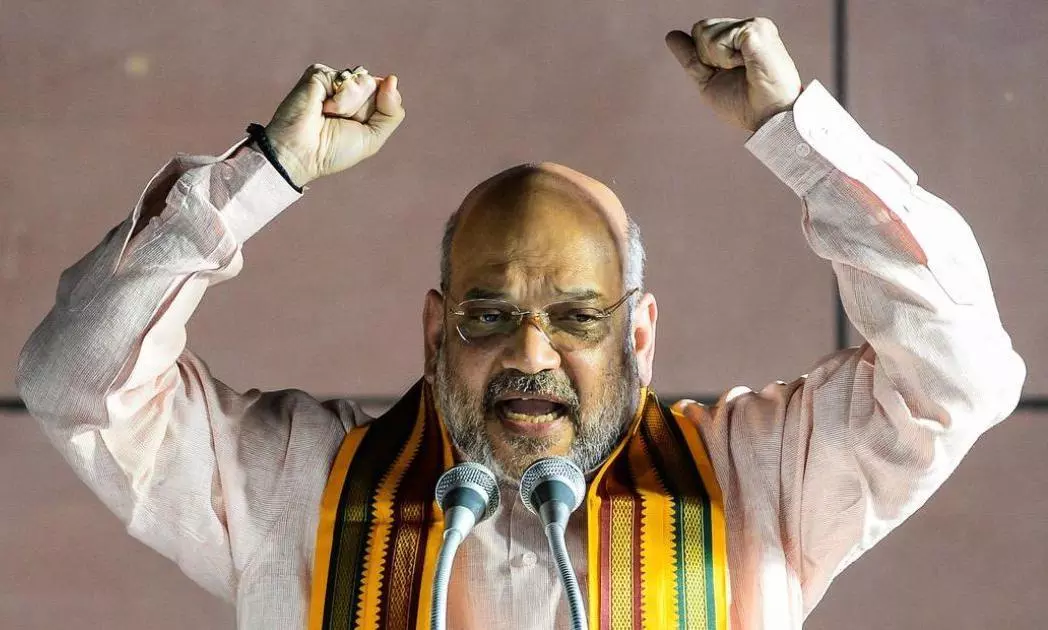
Munambam Waqf issue decoded
text_fieldsThe genesis
A number of families on the northern tip of Vypin Island in Ernakulam district have been on strike for the past four weeks fearing that they will be displaced from the 404.76 acres of land there. The state government has repeatedly made it clear that no one will be displaced and that it will stand with the people of Munambam. Even then, the protest is spreading to many corners in different forms.
While no one has claimed that the solution to the problem is to evict the common people from their homes, questions arise as to why such a strike is taking place now since some of those who lead the protest from the front and behind are making a conscious effort to divert its attention. It has already been stated by many including ministers that there have been attempts to divide the communities in Munambam in the pretext of the issue. The answer to the question of whether the government can take the initiative to solve it has finally been given. The government has called a high-level meeting on November 28 to discuss the matter.
Munambam land and Farook College
What is the Munambam issue? The land has a decades-long history of litigation, revenue proceedings and dispute resolution. The 404.76 acres of land said to have been leased by the Maharaja of Travancore to Abdul Sattar Sait, a Gujarati who came to Kochi in 1902, was formally registered by Siddique Sait, a descendant of Sattar Sait, in 1948. The land lying in 18 survey numbers in Kuzhupilly and Pallipuram villages, in Kochi Kanayannur taluk, by Siddique Sait, Bambalaseri Bungalow, Mattanchery was registered as waqf on November 1, 1950, to the then President Khan Bahadur PK Unnikammu sahib, Palakkad Olavakode, on behalf of Farook College Managing Committee under Doc No. 2115/1950 at Edappally Sub-Registrar Office.
Text of transfer as waqf:
Waqf is the donation of the land owned by the believers as submission to God in the hope of salvation in the Hereafter and the pleasure of God. The relevant narration made on that day in the Waqf document pertaining to the land in question reads as follows:
"As per the Conveyance Deed of Edappally Sub-Registrar Office bearing No. 875 of 1123, I have in possession with full freedom of sale and possession, and have done mutation procedures and registered as Pattayam No. 56, the leased land after clearing all taxes, I have been using the property without any room for complaint. From this, I hereby transfer as waqf the below-mentioned land carrying a value of one lakh rupees, and having an extent of 404 acres and 76 cents with all the appurtenances thereon, and in the belief that the said College will manage it as per Islamic ideals, for the peace of my soul, with the terms mentioned below to your possession, on behalf of the said managing committee forfeiting all my rights “
The main provisions of the deed were that the property and its belongings and the income derived from it should not be used for anything other than the educational purpose of Farook College and that if at any time the college should cease to exist, he and his successors would have the right and authority to get back the land. Even if there is now a claim that families were living in it at the time of making the waqf, there was no indication of that in the waqf deed. At that time, this place was included in Vadakkekara Village in Paravur taluk. On March 28, 1951, the Tahsildar of Paravur allotted the land Number 609 Pokuvarav Pattayam.
Encroachment and court proceedings
Farook College appointed some individuals to oversee the cultivation of waqf land in Munambam and to collect income. In the absence of direct attention and involvement of the college, the land got alienated in the course of time. Complaints were raised that some of the common people who were fishermen put up their houses there. Among them were also some bigwigs and monopolists who had an eye on the commercial potential of the place. Realizing the seriousness of the matter, Farook College authorities entrusted a lawyer in Ernakulam, MV Paul with power of attorney and special agreement to protect the land. It is said that he split the land and sold many parts with and without the knowledge of the college authorities and the college also received the monies from it. There are records that the land was passed to several individuals through conveyance by the college authorities and they have received the resurvey records which came into force in 2005. Many of the land documents were issued certificate of mutation and owners were allowed to pay land tax by the Village Officer.
What the court said
A dispute arose in 1967 regarding the cultivation and revenue collection of 114 acres of land leased by the college authorities. A petition (No: 53/1967) was filed in this regard in Paravur Sub Court. The court appointed a Receiver. In its judgment dated 12th July 1971 (para 43), the court clarified that this was not a Gift Deed but a Waqf Deed. An appeal (No. 600/1971) was filed against this in the High Court. The order of the Sub Court was upheld on 30th September 1975. "On careful consideration of various aspects of the matter, documents, and statements, the order of the trial Court is not interfered with and therefore the appeal is dismissed.” In 2008 and 2009, the Collector's reply given to the High Court in relation to this case also said that it was Waqf land. On January 23, 1990, the Village Officer of Kizhupilly gave a possession certificate to Farook College for this land.
Propaganda of different sorts
However, what is now being widely propagated is that the High Court ruled in 1975 that the land was gifted to Farook College. It can be said that the actions of the Farook College authorities who sold the land given to Waqf despite having no right to sell it and those who bought the land knowing or not knowing the legal issues in it, can be said to have brought the problem to the current complicated situation. The power of attorney to the lawyer in Ernakulam was given on 27th December 1998. The land was sold many times through him. There are bigwigs who bought land even though they knew trom preceding documents that it was waqf land and there are ordinary people who backed away from transactions fearing legal entanglements.
The land was purchased after checking the document
Those who bought the land say that they paid the price fixed by the college authorities and made the deal after checking the documents provided by them. Apparently, serious lapses did happen in such sales on the part of the college authorities and those entrusted by them. There are also cases where the middlemen transferred the land to others, created two or three documents in a planned manner, and sold them to the people really in need. The manipulation of creating additional leases was done so as to prevent the land from being identified as waqf property when preceding documents were examined during the sale. Families are living on one-third of the over 404 acres of land. The rest is in the hands of big landowners and resort owners, and there are also expatriates who have bought from the rest of the land after realizing the commercial tourism potential of the area. 212 possessors have land varying from 25 cents to 1.75 acres.
Nissar Commission Report
In response to complaints regarding the widespread encroachment of Waqf land, Paloli Mohammed Kutty, the Waqf Minister in the V.S. Achuthanandan cabinet, appointed a commission in 2008, headed by retired district judge M.A. Nissar, to investigate the issue. The Commission issued notice to the management of Farook College over complaints of the unauthorized sale of 404 acres of Waqf land. The Commission submitted its report to the government on October 30, 2009. The finding of the Commission was that 600 acres of Waqf land in 23 locations in the state had been illegally encroached upon, with the Munambam area being identified as the most affected. The Commission's report stated that the land in question belonged to Waqf, and Farook College authorities had conducted unauthorized sales using authority that it did not have. In 1992, the college management sold land twice (File numbers: 2246/1992, 113/1992), and once in 1993 (File number: 896/1993). In these records, the land, which was Waqf's property, was falsely recorded as a gift deed, deliberately concealing its true nature. Consequently, the Commission recommended that the Waqf Board should initiate action to recover the land. The Cabinet which met on May 3, 2010, approved the recommendations of the Nissar Commission. Following this, the Waqf Board, under government orders, initiated steps to reclaim the land. However, due to legal procedures, investigations, and delays in court rulings, 10 years passed.
Intervention of the Waqf Board
Under Section 32 of the Waqf Act of 1995, the Waqf Board has the overall responsibility for the supervision and regulation of all Waqf institutions in the state. According to Section 40 of the Act, the Board has the authority to investigate and determine whether a property is Waqf property or not, following investigations and due procedures. Once a property is identified as Waqf, it gains full legal validity. However, for over 60 years, the land in Munambam was not registered with the Waqf Board by the authorities of Farook College. Pointing this out, the heirs of Siddique Sait filed a case (E.P. 685/2008) with the Waqf Board, demanding the recovery of encroached land from Farook College. In response to this, on May 20, 2019, the Board issued an order instructing the Farook College managing committee, the custodian of the Munambam land, to submit documents within 15 days from receipt of the notice to register the land with the Board under Section 36 of the Waqf Act. Failing that, the Waqf Board would independently register the land as per Document No: 2115/1950 making Farook College the mutawalli (custodian), based on available documents and assigning the Junior Superintendent at the Board headquarters to register it. Since the College Managing Committee failed to produce the documents and complete the registration, on September 25, 2019, the Board registered the land on its own with record number 9980/RA.
Whose side is the State Government on?
Following the Nissar Commission's findings, and based on the 2010 government order to take action for reclaiming the land, the then Chief Executive Officer of the Waqf Board, B.M. Jamal, sent a letter to the Kochi Taluk Tehsildar on January 13, 2022. The letter stated that no taxes should be collected, no Mutation certificates (pokkuvaravu) should be issued, no transfers should be made to any other individuals, and no similar actions should be taken with regard to this land in the Kuzhuppilli or Pallipuram villages. According to Section 36(A) of the Waqf Act of 1954 and Section 51 of the Waqf Act of 1995, the sale, donation, or transfer of Waqf properties without prior approval from the Waqf Board is illegal. The letter further stated that the 2013 Waqf Amendment Act removed the Waqf Board's authority to grant such approvals. However, Jamal stated that Waqf Minister V. Abdurahman had directly asked him to withdraw the letter and facilitate tax payments. When Jamal requested an official government order for this, the minister was of the view that he should retract the letter on his own.
When the CEO was not prepared to do as demanded by the minister, the Kochi Tax Tehsildar issued an order on October 7, 2022, to collect land tax as per the decision of a sub-committee comprising the Waqf and Revenue Ministers and the Principal Secretaries of these departments. Jamal points out that the government itself, which had issued the order to take action to recover the land as per the Nissar Commission report, was applying double standards while providing an opportunity for the residents to collect the tax. He also alleges that it was the same people close to the minister who approached the court, questioning the government's order to collect the tax.
The matter comes back to court
State President, Kerala Waqf Protection Forum, TM Abdul Salam Pattalam and Secretary Nassar Manayil filed a petition in the High Court challenging the Kochi Tax Tehsildar's order dated October 7, 2022, to collect land tax from those who had illegally encroached on Waqf properties. The petitioner argued that the property registered under the Waqf Act in the Edappally Registrar Office in 1950 for the educational and cultural development of the Muslim community was transferred illegally and contrary to its objectives.
The petition pointed out that the sale was made with the knowledge that it was Waqf land, that the government had previously informed the court that steps had been taken to recover the land and that the court ordered the recovery of the Waqf land on a petition filed by the Kerala Waqf Protection Board challenging the order issued by the government in 2014. The law clearly states that Waqf land can never be transferred; no matter how many years it is held or however many times it changes hands, Waqf land will remain as it is. On this petition, the High Court Single Bench in November 2022 ordered the status quo to continue. However, later, there came another judgement that there was no bar on providing revenue documents and receiving taxes. The Waqf Protection Forum filed an appeal against this, and the vacation division bench nullified this judgment and issued an interim order. In February 2023, this order was confirmed in a judgement.
In October, the possessors of land, including one Joseph Benny, filed a petition in the high court alleging that the land where 600 families live in Munambam was included in the Waqf property. The petition also seeks to declare certain sections of the Central Waqf Act unconstitutional. The petition points out that subsequent to the Waqf Act coming into force in 1954, a new law was made in 1995, and an amendment was made in 2013, through which unrestricted powers were granted to the Waqf Board to register any property in the Waqf. The prayer in the petition is to declare Sections 4, 5, 36 and 40 of the Act as unconstitutional and to stay the process of registering the petitioners' properties in Waqf.
The in and out of the protests
For the last month, protests have been going on in the contentious area of Munambam. The protest is against the ‘attempts by the Waqf Board to encroach’ on the land that has been purchased and occupied for years. The protest is led by the Munambam Bhu Samrakshana Samiti, including common people who are local residents. No one is demanding that the families who have been occupying the land for years be evicted. It is the governments - which are constitutionally obligated to provide security to the believers of various religions to protect the land donated by the believers in the path of God in accordance with their interests - that oversee the Waqf Act and its reforms and have entrusted the Board with its implementation. What has now caused the unrest in Munambam is the government's discovery of violations of those legal provisions and its proposal of a legal solution to it. It is the government that should find a solution to it. And instead of striving for it, vested interests are in an attempt to turn this into an issue between communities.
It is the government that has found that in a piece of land donated by a believer in Islam to an institution run on Islamic religious principles, there have been lapses, and is proposing a solution for that. Therefore, the onus of untying this knot is also on the government of Kerala. However, instead of persuading the government to do that, hate-mongering politicians have set out to turn it into a conflict between two religions. This is what has vitiated the atmosphere in Munambam. The Sangh Parivar and extremist Christian groups, making this a weapon to fuel hatred among Christians against Muslims have come out in the open. Muslim organizations are demanding that the government intervene urgently and find a fair solution. There is growing support for the demand that those who illegally sold the Waqf land and their accomplices should not be spared, and that those who bought the land should not be victimized by putting them in legal entanglements.
Various political parties and community organizations have come out in support of the protest. CPI state secretary Binoy Viswam, Kerala Congress leaders Jose K. Mani, and P.J. Joseph have visited the protest site to express solidarity. Even the CPM, which represents the Vypin assembly constituency where the issue has arisen, is with the protesters. The Congress and the Muslim League have also taken a stand against evicting families.
The attempt to add fuel to the fire
The most mysterious aspect of this situation is the BJP's attempts to keep this issue burning. They are linking it to the proposed Waqf Amendment Bill, spreading rumours that the Muslim community's opposition to the bill is aimed at evicting people living in Munambam and other places. Even those who are knowledgeable about the law are spreading the notion that if the Munambam land is handed over to the Waqf Board, the Board will stake a claim to many other lands in the future and people will have to vacate them.
At the same time, there is also a concern among the Muslim community, now under the shadow of the central government's current move to grab Waqf properties, about what will happen to the numerous Waqf properties that have been encroached upon in the state and other parts of the country, if Waqf land in possession of encroachers and of those who took a share in them is conceded to them. Mature organizations have expressed the opinion that what is needed in this matter is a solution that respects the right of the Munambam residents to live and does not create a chasm in communal harmony. The most dangerous fact is that some people fear that such a solution will go against their interests.
The government must take the initiative
While political parties engage in mutual blame game and communal organizations attempt to capitalize on the situation, impartial observers seek a permanent solution that untangles the legal knots and does not sow discord among communities. The hopes of the residents of Munambam, protesters, and peace-loving people are now pinned on the high-level meeting convened by the government. A peaceful solution is what everyone desires and it is the state government that must take the initiative for this. The Waqf Board has clarified that no one will be displaced and the government has said that a mutually agreeable solution will be found. The longer the solution is delayed, the greater the chances of vested interests succeeding. Legal experts also opine that solutions should be sought with due acknowledgement of the shortcomings on both sides.
Vox populi
Kerala is one of the remaining havens of friendship and amity. For those who are eager to drown this land, whatever the dispute, their motive is one: power. For that, they are spreading far and wide innumerable lies and hatred of other religions all over Kerala, focusing on the coast of the coast of Munambam. In today's Indian situation, no one needs to be told who is trying to gain by leading this. Also seen is the 'special social engineering' found by the Kerala government in the recent past, to keep only one section of the population on the enemy's side to gain electoral advantage, being tested.
When the property given by some of the Muslim believers in search of God's mercy, or waqf is being portrayed as a concession or gift by the authorities or others. When lies are being disseminated in this manner, ordinary people get into confusion. And such are being revealed making one suspect that the government, which is supposed to explain the truth and protect the harmonious environment, is preparing Munambam to be the ‘election engineering’ tool of their party.
The tale told by Munambam is one of the landed property which believers bequeathed for the uplift of the community, and got into alien hands because of the mismanagement of those who are bound to manage it. Many people bought that land knowing or not knowing that it was waqf property. It is understandable that they started the agitation of the fear of losing the land that they had bought without looking at any of the provisions of the Waqf Act.
It is because of recognition of this that the first ones who voiced their demand to end the grief of hundreds of people in Munambam were the members of the Muslim community who are now being blamed by some. Those who are trying to fan communal flames in the Munambam dispute, to which no community is a party, should be identified. May the strength of survival of Malayalam to move ahead in quest of amicable solutions to problems through harmony keeping away the advocates of hatred, be evident here as well.
Muslim Delegation visit to protest tent
A delegation of Paravur-Vypin region Mahal Aikyavedi (unity forum) visited the strike tent at the invitation of the Munambam leaders who are in the struggle for the protection of revenue land.
During the discussion with the leaders of the protest committee, the delegation stated that the protection of the Waqf property is a serious matter, but all Muslim organizations are against the eviction of Munambam residents. The leaders demanded that the revenue rights of those who bought the land should be protected, the government should intervene and find a solution to the problem, and everyone should recognize and beware of the attempt for communal polarisation under the guise of the struggle.
The delegation comprising former MLA T.A. Ahmed Kabir, Onambilly Abdussalam Maulavi, Njalakam Juma Masjid Imam Sulaiman Maulavi, Ernakulam Grand Masjid Imam Faisal Azhari, Edavanakkad Mahal Imam Muhammad Salim Nadvi, Manjali Imam Sameer Alhasani, Mahal Aikyavedi leaders K.B. Kasim, K.K. Jamaluddin, E.K. Ashraf were received by a team led Fr. Anthony Tharail, Joseph Benny, Sebastian and Sunil Choothamparampil.
The vicars of the church said that it was for the first time even after such a serious problem had arisen that a Muslim delegation visited the place and gave a reassuring response. Munambam Mahal Imam Usman Baqavi, Mahal Jamaat Committee President Zakaria Palathinkal and Secretary P.A. Mohammad Nissar coordinated the proceedings.
FACT-SHEET
What is Waqf?
Waqf is a form of endowment in Islam, where a Muslim dedicates a portion of their property for religious, charitable, or social purposes. In Islam, this act is considered a pious deed intended to benefit humanity perpetually and to be preserved for human welfare. In Islamic societies, mosques, educational institutions, orphanages, graveyards, and shrines are often maintained through the principles of waqf.
What is a Waqf Board?
The Indian Constitution, under Article 26, guarantees the right of all religious denominations to establish and maintain religious institutions. To facilitate this, there are government-supported bodies for different religious communities. For Hindus, there are Devaswom Boards that manage Hindu religious endowments according to various state laws. Sikhs have specific laws governing the management of Gurdwaras. Various Christian denominations are registered under the Indian Companies Act to manage their institutions. Similarly, the Waqf Board is the institution established for Muslims, governed by the Waqf Act of 1995.
Waqf Properties and the Board
A common misconception widely circulated to justify the Waqf Bill introduced by the NDA government is the exaggerated financial power of the Waqf Board. This propaganda portrays the Waqf Board as the sole owner of Waqf properties in India. It is a continuation of the BJP's election campaign narrative during the previous Lok Sabha elections, which aimed to create the impression that Muslims were encroaching upon the rights and properties of other religious communities. The propaganda grossly exaggerates the Waqf Board's financial strength, claiming it to be the second largest financial entity after the Railways and Defense. In reality, the Waqf Board has no ownership rights over Waqf properties.
In Kerala, for instance, the Board directly owns only 30 cents of land. The Board's primary responsibility is to protect the property dedicated to Waqf according to the donor's intentions. If the Board fails to fulfil this duty, the government has the authority to dissolve it and establish a new system.
Waqf Tribunals
Tribunals are an alternative dispute resolution mechanism prevalent worldwide. They are established to reduce the burden of courts in legal matters. In India, there are numerous disputes related to the properties of various religious communities. Therefore, each state has Waqf Tribunals, operating under the provisions of the 1995 Waqf Act, to resolve such disputes. These tribunals are funded by the Waqf Board.
The Waqf Amendment Bill introduced by the BJP government undermines the constitutional rights of Muslims to protect Waqf properties. Any amendments to the religious endowment laws of any religious community should be made at the request of the community itself and with their full confidence. The proposed conditions in the Amendment Bill have clauses that could not be found in any of the laws governing Churches, temples, and Gurdwaras. This violates the constitutional principle of treating all religious communities equally.
What Farook College Managing Committee says
The response of the Managing Committee of Farook College is this: The Commission's finding that the waqf property was sold is baseless. In 1950, the land was registered in favour of the college committee with the right of the transaction. As per the terms in the document, it is only a gift deed. Out of 404 acres, 300 acres are spread over backwaters and the Arabian Sea and have been surveyed by the government as part of the Arabian Sea. The College took legal steps to nullify that portion. This part has been separated with a sea wall built from north to south at the cost of the government. In a situation where it was not practical to vacate the land occupied by around 400 people, including a mix of tenants, squatters and encroachers, documents were registered in their favour based on previous possession through a decision by mediation. The college management committee has not transferred the land to anyone illegally, says Farooq College Managing Committee.
The Land was purchased after verifying the documents
Those who bought the land claim they purchased it at the price fixed by the College authorities after verifying the documents provided by them. However, there was a grave lapse in these sales on the part of the College authorities and their power of attorney holders. In some cases, intermediaries initially transferred the land to others, created two or three preceding documents in a planned manner, and then sold the land to genuine buyers. These preceding documents were created to hide the fact that the land being purchased was waqf land. Families currently occupy approximately one-third of the land, with an extent of over 404 acres, while the remainder is held by influential individuals and resort owners. Among those who acquired land after realising its commercial and tourism potential are expatriates who even entered into benami deals. Of the total possessors, 212 own parcels of land ranging from 25 cents to 1.75 acres.





















